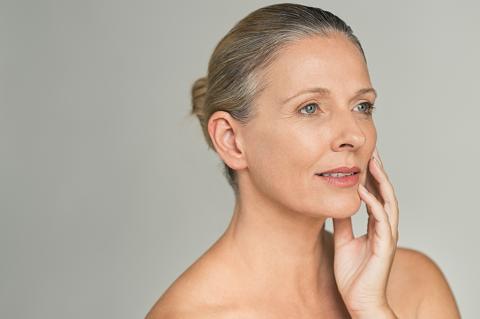
3 Ways to Improve Dry Skin
It’s that time of the year, after months of cold weather, when our skin starts to appear dry, dull and flaky. During Winter, the humidity level in the air is substantially less than in the warmer months and so this cold, dry air outside pulls moisture from our skin resulting in dry, dull and lacklustre skin.
The good news is that there are lots of natural ways to reduce and lessen dryness and restore the skin’s healthy barriers. Here are our top tips for combating dull, dry skin:
Drink More Water
Adequate internal hydration is a critical part of skin health – water accounts for about 60% of our over-all body composition. Although the exact mechanism isn’t fully understood, adequate water intake appears to play a role in skin hydration and maintaining the suppleness of skin and insufficient water in-take has been implicated in various skin dysfunctions.
The guidelines for water intake range from 2.7-3.7 liters per day and depend on your body size, external temperature/environment, health status and physical activity level. If you don’t like the taste of water, consider flavouring it with a splash of juice, some citrus fruits or any dried fruit. An excellent way to increase your water intake is to include more water-rich, fruits and vegetables such as cucumber, spinach, broccoli, brussels sprouts, strawberries, zucchini, bell peppers and celery. Fruits and vegetables also contain micronutrients and antioxidants that are important for overall skin health.
Follow a Dry Skin Brushing Routine
Dry brushing is a classic ayurvedic ritual that involves brushing your full body with a soft, natural-bristle brush. Dry brushing works to improve circulation and buffs the skin, sloughing off old, dead skin cells, so that any treatments you apply afterwards, can be even more effective.
It’s best to dry brush before showering. Using a natural-bristle soft brush (available at most health food stores), start at your feet and, with medium pressure, apply long brush strokes in the direction of your heart. The goal is to follow the circulatory system: brush up the legs, overlapping in especially dry spots, to the torso. On the chest and back, apply a figure-8 pattern and end of the arms, again, brushing with long strokes in the direction of your heart.
After dry brushing, hit a warm temperature shower - hot water during the cold winter months can also contribute to dry skin. Once done, gently, pat your skin dry and immediately apply a moisturizer. Moisturizing ingredients can include aloe, cocoa seed butter, hemp seed butter, shea butter, jojoba, sunflower seed oil, hyaluronic acid and ceramides. Avoid these ingredients that have the potential to dry skin: alcohol, sodium laurel sulphate and salicylic acid.
Eat More Fish
Fatty acids are an important component of our skin and are essential for maintaining a healthy skin bar-rier. Essential fatty acids (EFAs) are those that cannot be made by the body and need to be obtained from diet and/or supplementation.
Omega-3 fatty acids such as EPA and DHA found in fish are helpful for moisturizing the skin and fighting off dry, red, and irritated skin commonly associated with skin conditions such as dermatitis. EPA and DHA are also anti-inflammatory and can help to reduce inflammation that can contribute to dry skin.
Fish especially high in essential fatty acids are salmon, mackerel, trout, sardines, anchovies, herring and cod.
*Lastly, it’s important to ensure your primary care provider rules out any underlying conditions that could contribute to dry skin. These can include hypothyroidism and skin conditions such as dermatitis and psoriasis.
Author: Trina Kennedy, CCNM Integrative Cancer Centre intern
References:
Palma L, Marques LT, Bujan J, Rodrigues LM. Dietary water affects human skin hydration and biome-chanics. Clin Cosmet Investig Dermatol. 2015;8:413-421. Published 2015 Aug 3. doi:10.2147/CCID.S86822
Akdeniz M, Tomova-Simitchieva T, Dobos G, Blume-Peytavi U, Kottner J. Does dietary fluid intake affect skin hydration in healthy humans? A systematic literature review. Skin Res Technol. 2018;24(3):459-465. doi:10.1111/srt.12454
Huang TH, Wang PW, Yang SC, Chou WL, Fang JY. Cosmetic and Therapeutic Applications of Fish Oil's Fatty Acids on the Skin. Mar Drugs. 2018;16(8):256. Published 2018 Jul 30. doi:10.3390/md16080256
Balbás GM, Regaña MS, Millet PU. Study on the use of omega-3 fatty acids as a therapeutic supple-ment in treatment of psoriasis. Clin Cosmet Investig Dermatol. 2011;4:73-77. doi:10.2147/CCID.S17220
Kawamura A, Ooyama K, Kojima K, et al. Dietary supplementation of gamma-linolenic acid improves skin parameters in subjects with dry skin and mild atopic dermatitis. J Oleo Sci. 2011;60(12):597-607. doi:10.5650/jos.60.597
Russell M. Assessing the relationship between vitamin D3 and stratum corneum hydration for the treatment of xerotic skin. Nutrients. 2012;4(9):1213-1218. doi:10.3390/nu4091213
Safer JD. Thyroid hormone action on skin. Dermatoendocrinol. 2011;3(3):211-215. doi:10.4161/derm.3.3.17027